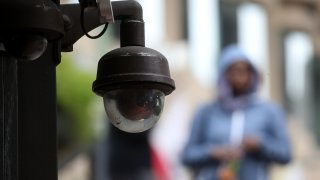
The Boston City Council voted unanimously Wednesday to pass a ban on the use of facial recognition technology by city government.
The move makes Boston the second-largest U.S. city after San Francisco to enact a ban. The city joins several other Massachusetts communities that passed similar bans, including Cambridge, Springfield, Northampton, Brookline and Somerville.
Get top local stories in Boston delivered to you every morning. Sign up for NBC Boston's News Headlines newsletter.
The move makes Boston the second-largest U.S. city after San Francisco to enact a ban.
“Boston should not use racially discriminatory technology that threatens the privacy and basic rights of our residents,” At-Large Boston City Councilor Michelle Wu said in a statement. “Community trust is the foundation for public safety and public health.”
The push comes after several studies have shown current facial recognition systems are more likely to err when identifying people with darker skin.
“While face surveillance is a danger to all people, no matter the color of their skin, the technology is a particularly serious threat to Black and brown people,” Councilor Ricardo Arroyo said in a statement.
Local
In-depth news coverage of the Greater Boston Area.
The ordinance, which uses language similar to other versions of the bill passed in other municipalities, would prevent city departments, including Boston police, from using any face surveillance system. City officials say the technology is not currently used by the Boston Police Department.
Wu and Arroyo proposed the ordinance, which went to a vote shortly before 12:45 p.m. on Wednesday. The measure now goes to Boston Mayor Marty Walsh's desk. If he takes no action in 15 days, it automatically becomes law.
The American Civil Liberties Union-Massachusetts has been pushing a bill on Beacon Hill that aims to establish a statewide moratorium on the government use of facial surveillance and other remote biometric screening technologies until the Legislature imposes checks and balances to protect the public’s interest.



